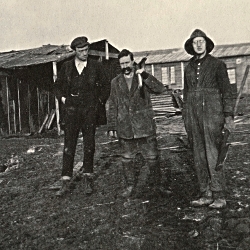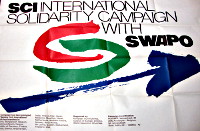Service Civil International
Poster 'SCI International Solidarity Campaign with SWAPO', late 1980s
by Heinz Gabathuler (Dec 29, 2016)
I found this poster only recently, when I was looking for material on the solidarity campaign with SWAPO and Namibia which had been coordinated by SEED. The abbreviation stands for Solidarity Exchanges Education Development - SCI's former North South commission based at the then European Secretariat in Antwerpen. It was a veteran who had been involved in SCI at that time, and in this campaign particularly, and who had asked whether there was some extra material that could be let to him.
The Archives catalogue tells us that there were two consecutive solidarity campaigns for the people in the once German South West Africa which had been illegally occupied by the South African apartheid regime for many decades: Before the independence of Namibia in 1990, it was the so-called Unimog campaign – named after a truck-like multi-purpose vehicle that toured through different countries (namely France, Britain, Belgium, West Germany) during the summer of 1988, collecting tools to be sent to the South West Africa People’s Organisation (SWAPO), and at the same time attracting attention and raising awareness among the population for the cause of the Namibian liberation movement. The second campaign was named breaking free and was run through the first years of the country’s independence.
The poster is 100 x 69,5 cm in size, and it highlights the abbreviations of the two organisations 'SCI' and 'SWAPO'. The co-operation of our movement - dedicated to practical, strictly non-violent means of social change – with a political party that has been fighting with military power for the independence of a country (and which is in government ever since independence has been achieved) may be surprising at first sight, and to my knowledge such co-operation of SCI with political-military organisations has not been repeated since. Furthermore, the poster shows an 'S' in red and green topping an arrow in blue: exactly the colours of SWAPO, and nowadays the colours of the Namibian national flag. The spirit of the campaign which, by the way, was supported by honourable institutions such as the European Communities (precursor of EU), the Council of Europe, UNESCO, and the World Council of Churches, reflects the spirit of a generation within SCI that followed the slogan words and deeds rather than deeds not words: The conviction that it was not enough just to do good deeds for the poor and the needy (e.g. collecting old tools in Europe and sending them to Africa) but that such deeds had to be carried out in the context of political awareness-raising.
It would require more research to find out whether this approach has still been disputed within SCI in the late 1980s, two decades after the students' revolt in the Western countries. Today, I am pretty sure, any visible co-operation with armed movements (be it in Syria, Colombia, Ukraine or elsewhere) would provoke huge discussions within the movement – if at all anyone would launch the initiative for such a campaign.
After the end of the second Namibia campaign, SCI / SEED turned its attention from Southern Africa towards Western Europe and run the Crossing borders campaign, aimed at sensitising workcamp participants and the wider public to the roots and causes of the influx of refugees into Western countries (see one of my previous pieces from the series The history of SCI in xx objects: http://archives.sci.ngo/crossing-border-1996.html) – an issue of unchanged relevance for SCI as a peace organisation!
Â
Heinz Gabathuler, International Archives Coordinator
Reference
One issue still to be found in box 46113.3 in the SCI International Archives; the one on the picture however has been reserved for the veteran who had asked for historical campaign material.




 Click to enlarge image
Click to enlarge image